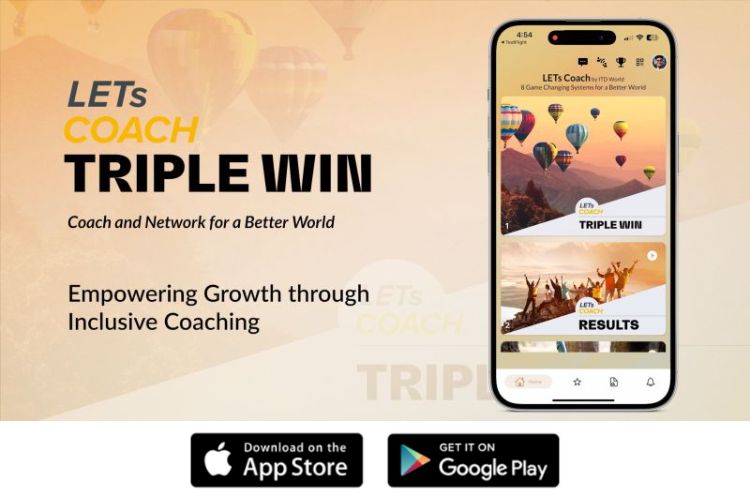From icebreakers to self-reflection prompts, discover a list of questions to ask as a mentor – chosen to cover a variety of domains and topics!
Embarking on a mentoring journey is a transformative experience for all parties involved. Yet, navigating these conversations requires thoughtful guidance and meaningful dialogue. In this guide, we will unveil 60 key questions to ask as a mentor – meticulously curated to empower people on their developmental paths!
|
Author: Jonathan M. Pham |
Highlights
- Mentoring questions are open-ended prompts that enable mentors to guide and empower their mentees by fostering understanding, self-discovery, and a strong relationship.
- Below, you will find a list of questions that can be applied in several settings – including (but not limited to) ice-breakers, goal setting, skill development, leadership, decision-making, self-reflection, interpersonal issues, etc.
- Aside, we also have an FAQ section to address some problems commonly faced in mentorship.
What Are Mentoring Questions?
Mentoring questions are those asked to cultivate a strong relationship between a mentor and a mentee – as well as to get the most out of it. They can be aimed at getting to know each other better, navigating career challenges, or setting goals for the mentorship itself.
Example:
- Getting to know each other: “Why did you decide to enroll for mentorship?” or “What are your career aspirations?”
- Career development: “What do you think are the most important skills to succeed in this field?” or “How can you overcome a roadblock faced at work?”
- Setting goals: “What are your goals for this relationship?” or “How often would you like to meet?”
Generally speaking, good mentoring questions are open-ended, thought-provoking, and encourage a two-way conversation. By asking thoughtful ones, mentors create a supportive and productive environment where their mentees are equipped to thrive.

Killer questions to ask as a mentor
Why Do Mentors Need to Ask Questions?
Why is asking questions important in mentoring? Some may wonder. In fact, there are several key reasons why it is such a crucial skill for mentors:
- Deeper understanding: Questions help a mentor get inside the mentee’s head and understand their perspective, goals, challenges, and thought processes. This allows the former to tailor their guidance and support to the specific needs of the latter.
- Self-discovery facilitation: By prompting thoughtful reflection, mentors empower mentees to arrive at their own solutions and develop critical thinking skills. This fosters a sense of ownership and increases the likelihood that the mentee will follow through on their plans.
- Rapport building: The act of asking questions demonstrates that the mentor is actively listening and interested in what the mentee has to say. As such, it builds trust and rapport, which is essential for a successful relationship.
- Uncovering hidden issues: Sometimes, mentees might not be fully aware of all the challenges they’re facing or important factors to consider. Well-placed prompts may then bring these things to light, allowing the mentor to provide more comprehensive support.
- Empowerment: Instead of simply giving advice, mentors who ask questions encourage mentees to take ownership of their development. This fosters a sense of self-reliance and confidence in one’s own abilities.
Overall, asking questions is a powerful tool that allows mentors to move beyond simply giving answers – and truly guide their mentees toward success.
Read more: 8 Effective Coaching Skills for Leaders & Managers

The power of questions in mentorship
Questions to Ask as a Mentor – by Topic
First meeting
In the initial encounter, it’s crucial to establish rapport and understanding. Below are a few icebreaker questions to help set a friendly tone, as well as inquiries about expectations to ensure alignment with the mentee’s goals.
- What motivated you to seek mentorship?
- Can you share a bit about your background and experiences?
- What do you hope to achieve through this relationship?
- How do you prefer to receive feedback?
- Is there anything specific you would like to discuss during our time together?
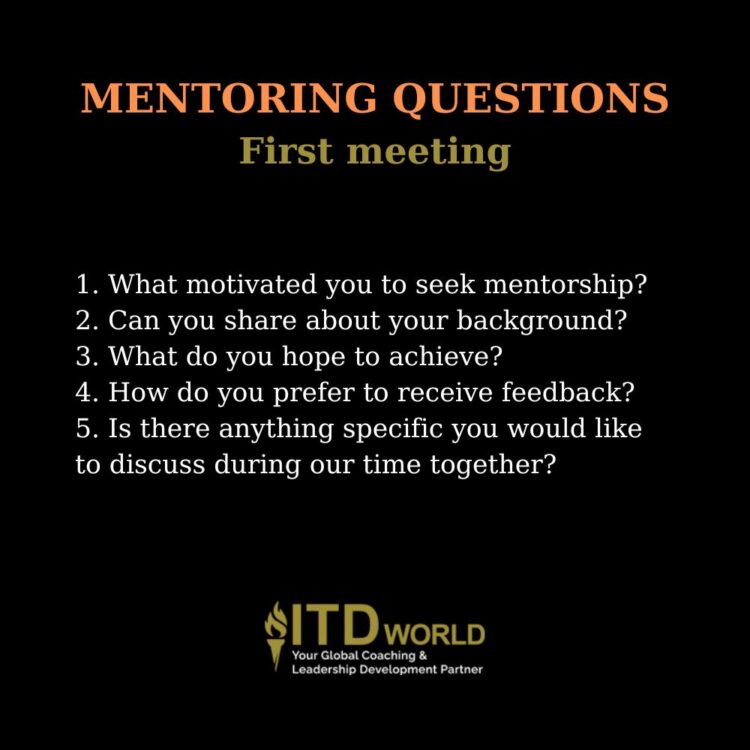
Career & goal setting
Setting a clear path for career development is essential. The questions in this section are meant to identify long-term aspirations, establish short-term objectives, and pinpoint areas for skill enhancement.
- Where do you envision yourself in your career five years from now?
- What are some immediate goals you are working towards?
- Are there any skills you feel are critical for your desired career path?
- How do you plan to measure progress toward your goals?
- What obstacles do you anticipate encountering along the way, and how can we address them?
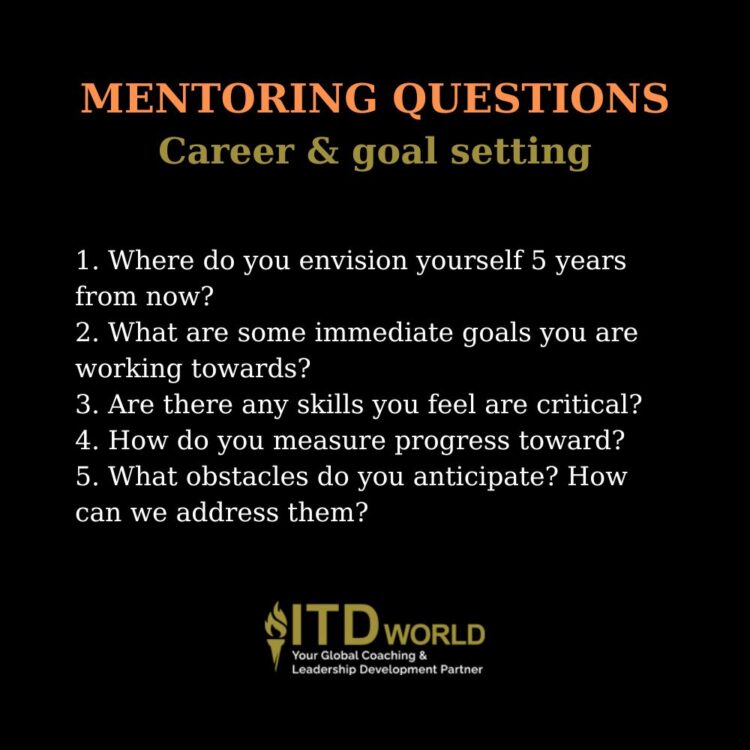
Self-awareness facilitation
Self-awareness is a fundamental aspect of personal growth. The prompts below encourage introspection and understanding of one’s values, strengths, and areas for improvement.
- What values are most important to you, both personally and professionally?
- Can you identify your top strengths and how you utilize them?
- In what areas do you feel you could improve?
- How do you typically respond to challenges or setbacks?
- What strategies do you use to maintain self-awareness and reflection?
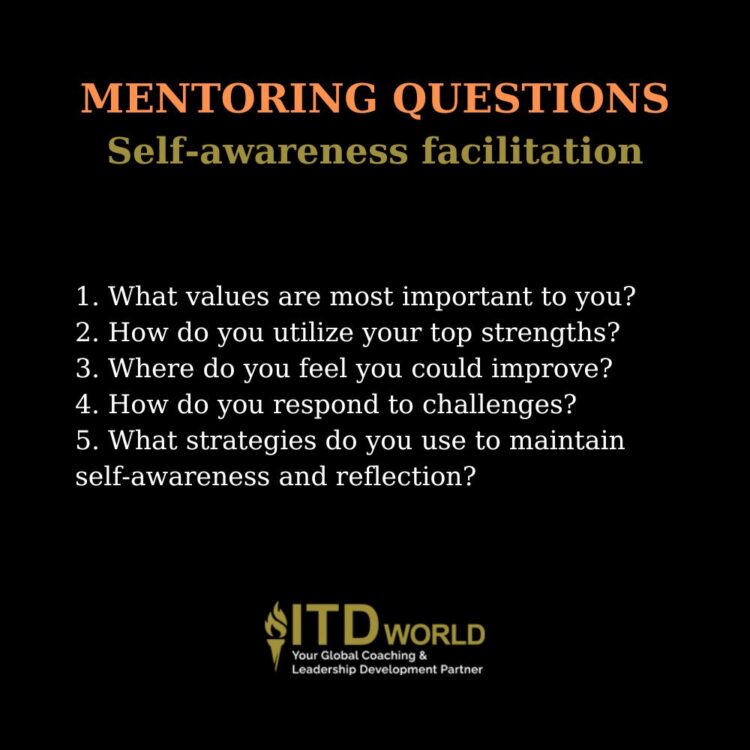
Killer questions to ask as a mentor
Strength & weakness identification
Recognizing strengths and weaknesses is key to leveraging talents and addressing developmental areas. This section focuses on pinpointing specific attributes and areas for growth.
- What tasks or activities energize you the most?
- Can you recall a time when you felt particularly effective or accomplished? What contributed to that feeling?
- What aspects of your work do you find most challenging?
- How do you typically approach areas where you feel less confident or skilled?
- Are there any patterns or themes you notice in the feedback you have received from others?
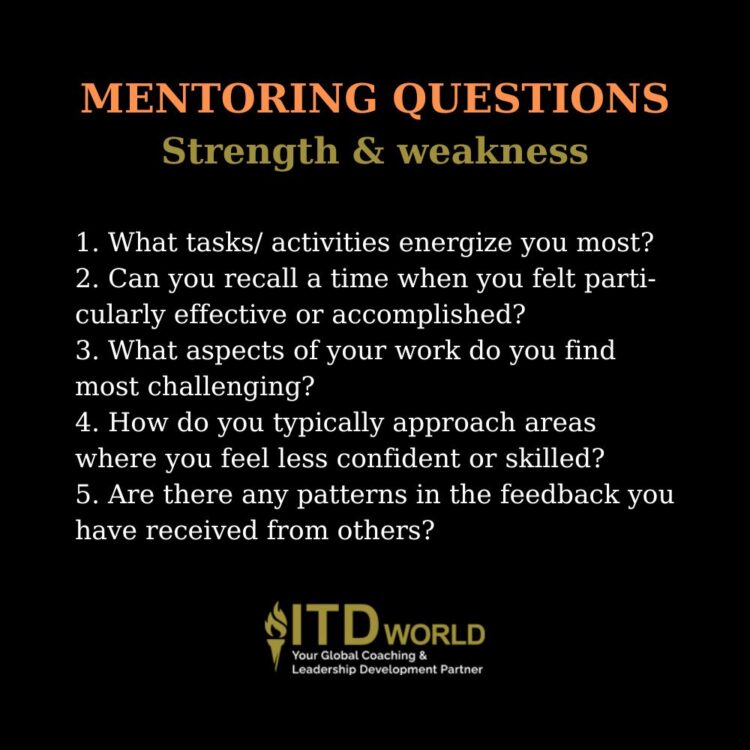
Skill development
Developing a diverse skill set is vital for professional development. These questions explore avenues for skill enhancement and strategies for implementation.
- Which skills do you believe are essential for success in your field?
- Are there any specific skills you would like to focus on improving?
- How do you currently prioritize skill development in your routine?
- What resources or support do you need to develop new skills effectively?
- Can you envision how mastering certain skills might advance your career goals?
Read more: Employee Skill Development – Strategies for Organizations to Boost the Bottom Line
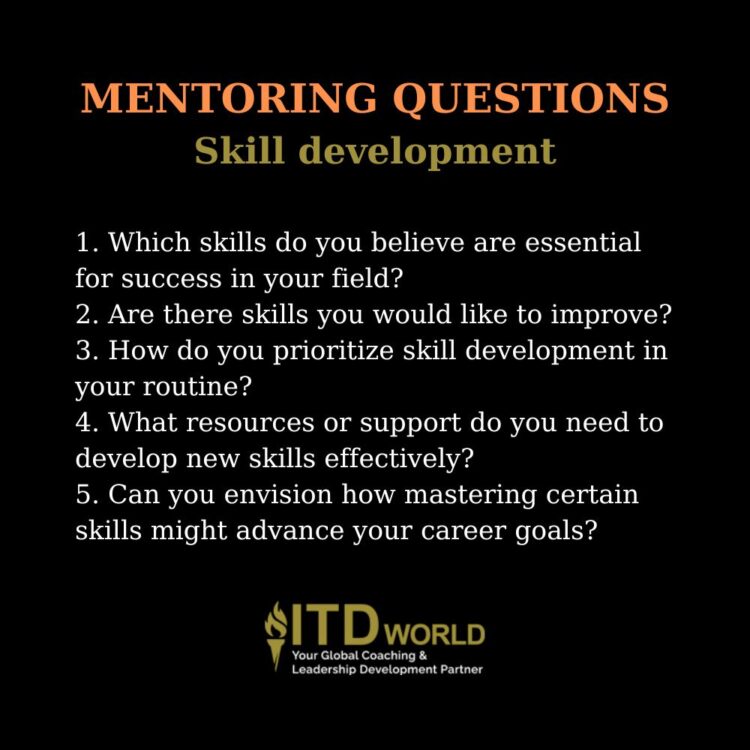
Questions to ask a mentee
Leadership development
Effective leadership is a cornerstone of professional advancement. This section delves into topics such as leadership styles, challenges, and strategies for moving forward.
- What qualities do you admire in the leaders you have worked with in the past?
- In what ways do you see yourself as a leader, regardless of your current role?
- What leadership challenges have you encountered, and how did you address them?
- Are there specific leadership techniques or approaches you would like to learn more about?
- How do you plan to cultivate leadership skills within your current role or future opportunities?
Read more: Leadership Development – A Mission-critical Strategic Function
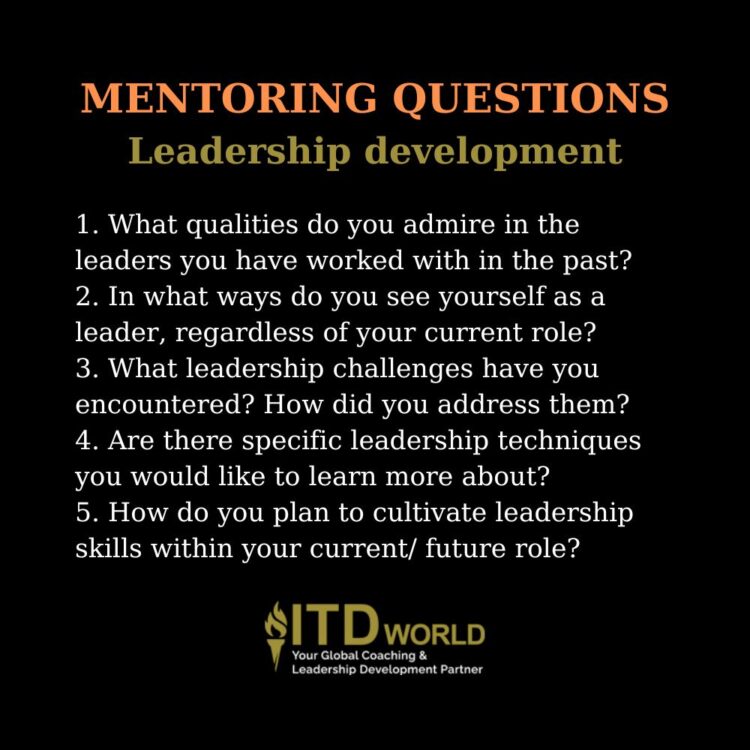
Business & decision making
Making sound decisions is essential in any professional context. These prompts explore decision-making processes, risk assessment, and strategic thinking.
- How do you typically approach decision-making, especially when faced with uncertainty?
- Can you recall a significant decision you made recently? What factors influenced your choice?
- What strategies do you use to evaluate risks and potential outcomes?
- How do you balance short-term gains with long-term objectives when making decisions?
- Are there decision-making scenarios you find particularly challenging? How can we work through them together?
Read more: Leading Through Uncertainty – How to Navigate Turbulent Times
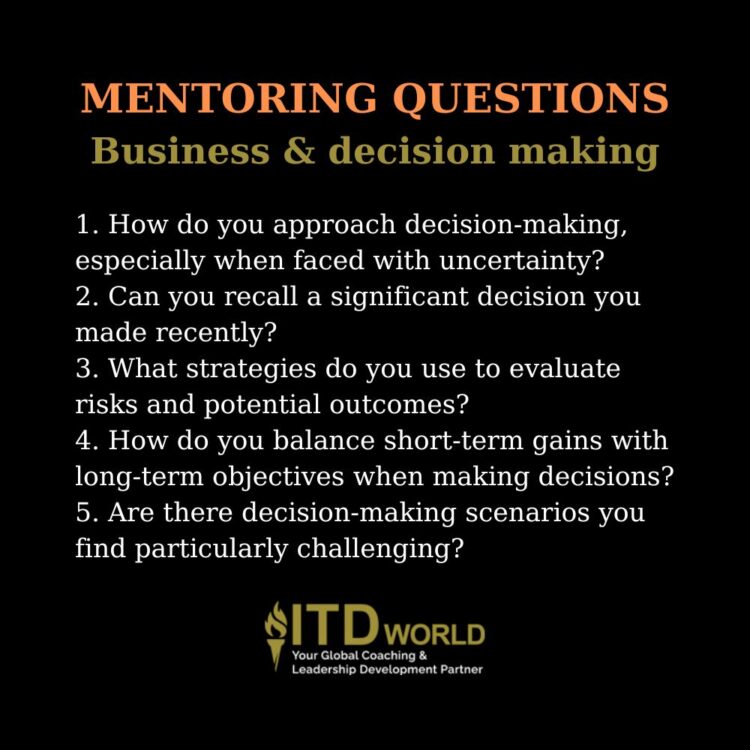
Communication
Effective communication is critical for fostering collaboration and understanding. This section examines communication styles, barriers, and techniques for improvement.
- How would you describe your communication style in professional settings?
- Can you recall a communication challenge you have faced recently? How did you navigate it?
- What strategies do you use to ensure clarity and understanding when interacting/ exchanging information with others?
- How do you approach difficult conversations or conflicts in the workplace?
- Are there specific areas of communication you would like to strengthen or refine?
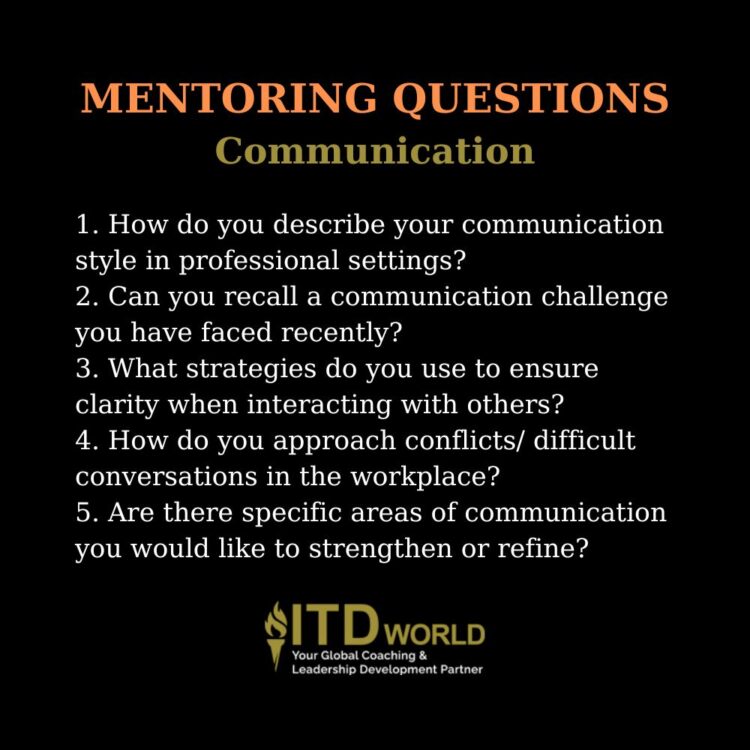
Personal & interpersonal challenges
Addressing personal and interpersonal challenges is integral to overall well-being and professional success. These questions delve into topics such as managing stress, building relationships, and maintaining work-life balance.
- How do you typically manage stress or pressure in your professional life?
- Can you identify any interpersonal challenges you are currently facing? How can I support you?
- What strategies do you use to foster positive relationships with colleagues or clients?
- How do you maintain a healthy balance between work and personal life?
- Are there any personal or professional boundaries you find challenging to maintain? How can we address them?
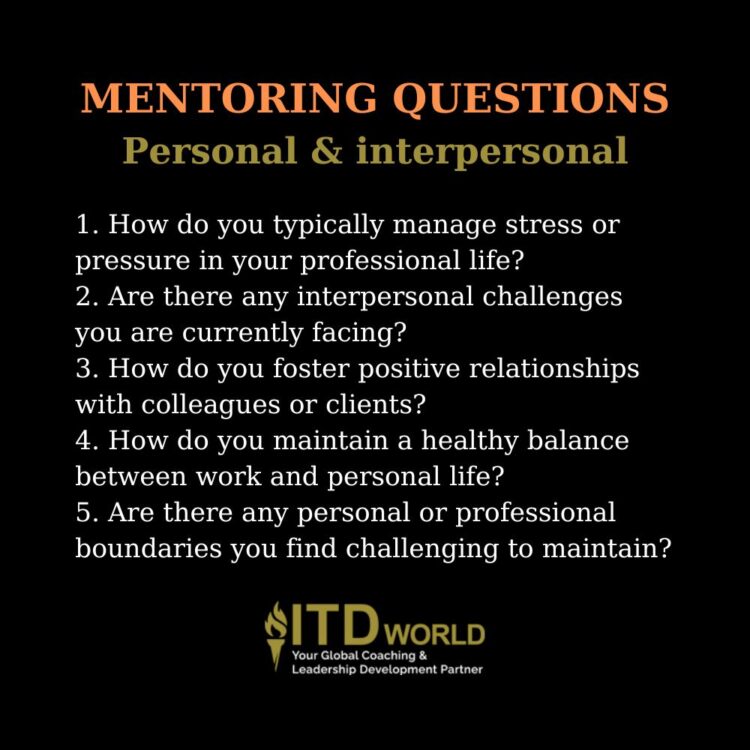
Self-reflection encouragement
Regular self-reflection is crucial for ongoing development. Here, let us go over some questions that are meant to prompt introspection and evaluation of progress.
- How do you make time for self-reflection in your busy schedule?
- Can you identify any recent successes or areas of growth?
- What lessons have you learned from recent experiences or challenges?
- How do you envision your ideal self in the future, both personally and professionally?
- Are there specific habits or practices you would like to implement to support ongoing self-reflection?
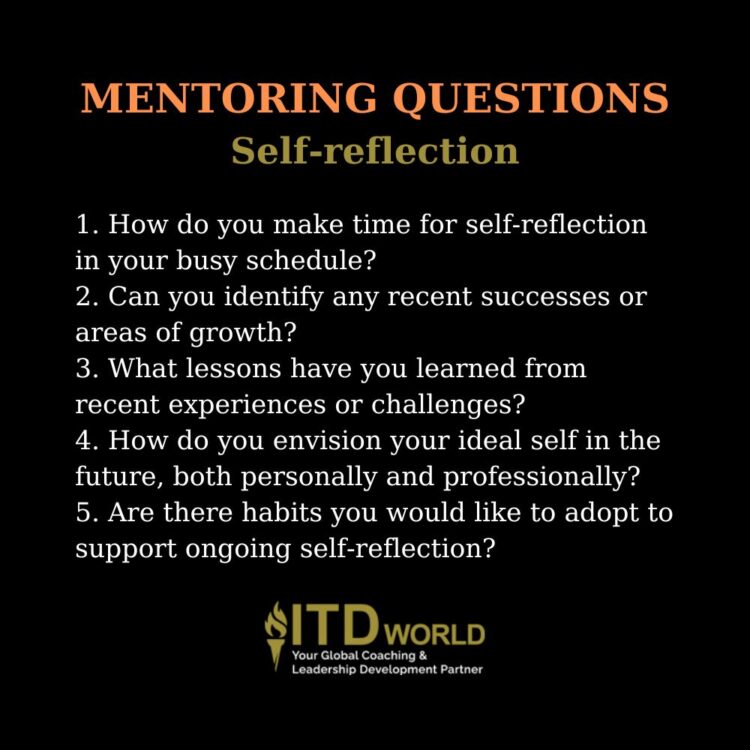
Feedback solicitation
Seeking feedback is essential for mentorship to be effective. Here are a few questions for mentees to provide insights into the process and how it can be improved.
- How do you feel our mentorship sessions have been going so far?
- Are there specific areas where you feel I could provide more support or guidance?
- What aspects of our relationship do you find most valuable?
- How can I better tailor our sessions to meet your individual needs and goals?
- Do you have any suggestions for how we can enhance the effectiveness of our relationship moving forward?
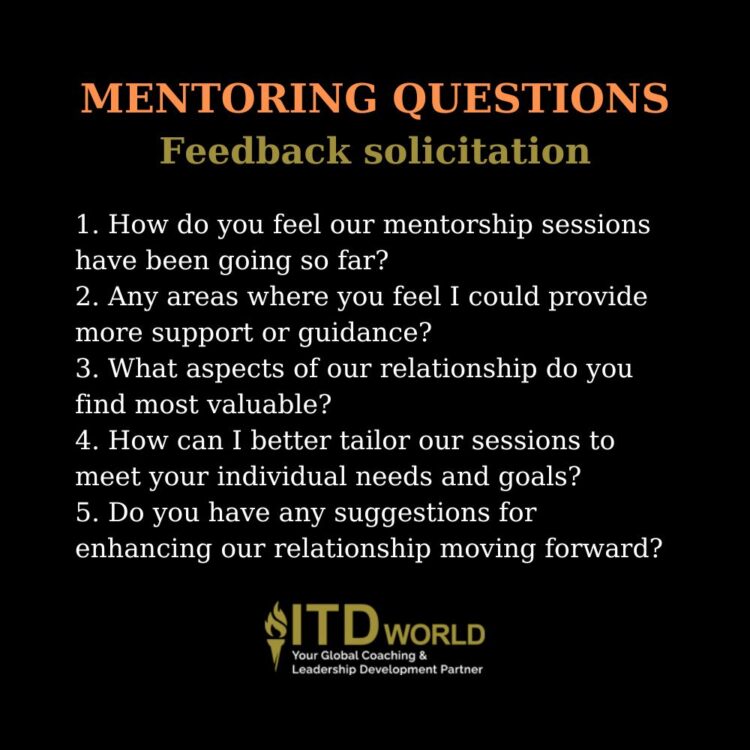
Killer questions to ask as a mentor
Bonus: Fun Questions to Ask Your Mentee
Building a strong rapport often involves lighthearted conversation. These questions aim to foster a relaxed atmosphere and strengthen the mentor-mentee bond.
- If you could have any superpower, what would it be and why?
- What is the best book you have read recently, and why did you enjoy it?
- If you could travel anywhere in the world tomorrow, where would you go?
- What is a hobby or interest of yours that you are particularly passionate about?
- If you could have dinner with any historical figure, who would it be, and what would you ask them?
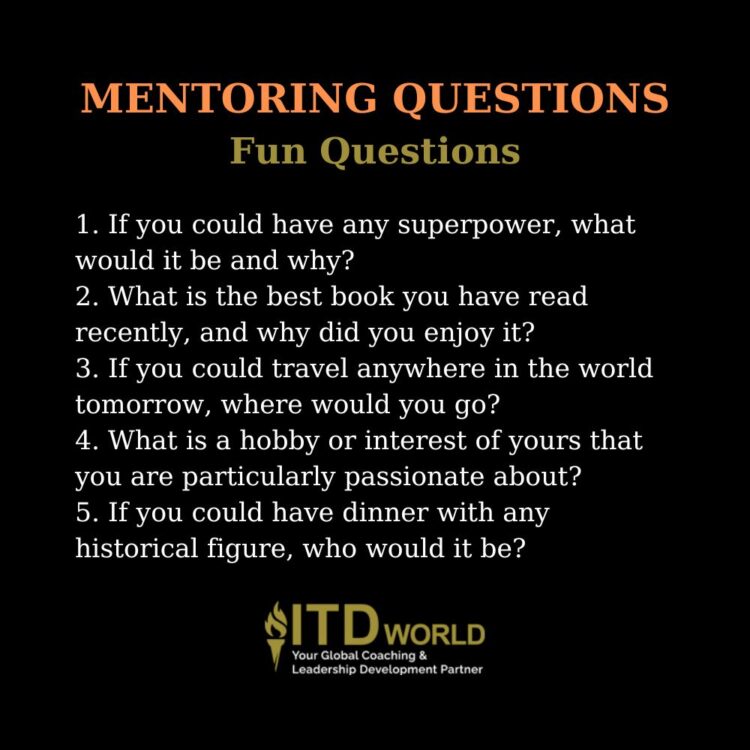
FAQs about Mentoring Questions
How do I leverage mentoring questions to facilitate the relationship?
Here are some tips on how to leverage such questions to facilitate a strong and successful relationship:
- Ask open-ended questions
Go beyond “yes” or “no” answers. Instead, start with “what,” “why,” or “how” to encourage deeper reflection and discussion.
Examples: “What are some challenges you’re facing in your current role?” or “How do you see this situation impacting your long-term goals?”
- Balance open-ended and closed-ended questions
While open-ended prompts are crucial, closed-ended ones may prove to be helpful for specific situations, especially when you need to gain clarity, confirm understanding, or make decisions.
Example: “On a scale of 1 to 10, how confident do you feel presenting this proposal?”
- Actively listen & follow up
Pay close attention to the mentee’s responses and ask follow-up questions to show you’re engaged. This demonstrates your interest, as well as helps clarify their thoughts and needs.
- Be situational
Don’t use a one-size-fits-all approach. Adapt your prompts based on the mentee’s current stage of development and specific goals.
Let’s say, for a new mentee, you want to focus on understanding their background and aspirations. For a more experienced one, it may be better to just delve into specific challenges they’re facing.
- Create a safe space for exploration
Phrase questions in a way that encourages honesty and open communication. Avoid judgment or criticism, and focus on creating a safe space for the mentee to explore their thoughts and feelings.
Example: “Is there anything you’re hesitant to discuss but would like feedback on?”
- Use powerful questions to spark growth
Don’t just focus on the problem; instead, encourage the mentee to consider new perspectives and solutions.
Example: “If you could overcome any obstacle right now, what would it be and why?” or “What would success look like in this situation?”
- Promote self-reflection
It is recommended to come up with questions that prompt the mentee to think critically about their own strengths, weaknesses, and motivations. As mentioned, self-awareness is key to personal and professional development.
Example: “What are some of the skills you bring to the table that might be helpful in this situation?”
Read more: Giving Effective Feedback – A Practical Guide for Success

Killer questions to ask as a mentor
What should a mentor discuss with a mentee?
Mentors may discuss a wide range of topics with their mentees, depending on the latter’s goals, career stage, and the overall focus of the relationship. Here are some general categories and specific ideas to get you started:
Career pathing:
- Goal Setting: Help your mentee define their short-term and long-term career goals.
- Industry insights: Share your knowledge of the mentee’s desired industry and potential career paths.
- Skill development: Identify the skills and experiences needed to achieve their goals and brainstorm ways to develop them.
- Networking strategies: Discuss effective strategies that help them build their professional network.
Professional development:
- Building strengths & addressing weaknesses: Help your mentee identify their strengths and weaknesses and develop strategies to improve in weaker areas.
- Communication skills: Discuss effective communication techniques for different situations.
- Work-life balance: Explore strategies for maintaining a healthy work-life balance.
- Time management: Share tips and tools for increased productivity.
Company-specific topics (if applicable):
- Workplace culture: Discuss the company culture and how the mentee can navigate it effectively.
- Performance management: Offer guidance on navigating performance reviews and workplace expectations.
- Internal Opportunities: Analyze potential opportunities for growth and advancement within the company.
- Company-specific challenges: Address any specific challenges the mentee is facing in their current role.
Additional ideas:
- Overcoming challenges: Help the mentee brainstorm solutions to challenges they’re facing in their work or career.
- Decision-making: Provide guidance and frameworks for effective decision-making.
- Finding inspiration: Discuss ways to stay motivated and inspired in their career.
All in all, the most important thing is to tailor the discussion to the mentee’s specific needs and goals. Let their inquiries and areas of interest guide the conversation!

Strategic questions to ask as a mentor
How often should mentors ask questions?
There’s no one-size-fits-all answer here. The ideal frequency will depend on several factors, such as:
- Stage of the relationship: In the beginning, mentors might need to ask more questions to establish rapport, understand the mentee’s goals, and assess their needs. As the relationship progresses, the topics discussed might become more focused on specific challenges or progress toward goals.
- Mentee’s communication style: Some people may be naturally chatty and open up readily; hence, they require fewer prompts. On the other hand, some might be more reserved and benefit from more frequent questions to draw them into the conversation.
- Meeting format and goals: Is it a casual check-in or a more structured meeting focused on a specific challenge?
Overall, here’s a guideline to keep in mind:
- Always be prepared: Even in informal settings, having a few prompts in mind can ensure the conversation stays productive and focused on the mentee’s needs.
- Focus on quality over quantity: Don’t barrage people with questions. Well-placed, open-ended inquiries that encourage reflection and discussion are more valuable than frequent, superficial ones.
- Maintain a balance between asking and listening: Give the mentee space to share their thoughts and experiences. Active listening is just as important as asking.
Additionally, if you notice the following signs, it might be time to engage with them:
- The mentee seems stuck or hesitant to elaborate on a point.
- There’s a lull in the conversation and you want to keep the momentum going.
- You need more clarity on the mentee’s thoughts or goals to provide effective guidance.
By being mindful of these factors and adapting your approach, you can ensure you’re leveraging the power of questioning effectively to facilitate a meaningful relationship.

How do I adapt questions based on the mentee’s experience level?
Here are some tips on adapting your prompts based on your mentee’s experience level:
For beginner:
- Focus on foundational knowledge: Ask questions that ensure they grasp the core concepts. Examples: “Can you walk me through the steps of…?” “What are the different types of…?”
- Use clear and concise language: Avoid jargon or overly complex terms.
- Offer specific examples: Illustrate concepts with real-world scenarios or case studies relevant to their field.
- Focus on building confidence: Ask questions that allow them to showcase their understanding and celebrate their progress.
Intermediate:
- Challenge them to apply their knowledge: Move beyond basic understanding and prompt them to analyze, synthesize, and solve problems. Examples: “How would you approach this situation…?” “What are the potential challenges of…?”
- Introduce new concepts and approaches: Expand their knowledge base by introducing them to new ideas and methods.
- Encourage critical thinking: Ask questions that prompt them to evaluate different perspectives and make reasoned decisions.
Advanced:
- Discuss complex issues and strategies: Engage them in discussions about intricate problems faced in your field.
- Encourage independent thinking: Ask open-ended questions that allow them to formulate their own solutions and approaches.
- Provide opportunities for ownership: Challenge them to share their expertise and potentially mentor others.

How do I handle difficult conversations with a mentee using questions?
Difficult conversations are an inevitable part of any mentor-mentee relationship; however, using questions effectively can help you navigate them productively. Here’s how:
Open-ended questions for understanding:
- Clarifying the issue: “Can you tell me more about what’s bothering you?” or “What specifically are you feeling frustrated about?”
- Exploring their perspective: “What have you tried so far to address this?” or “How do you see this situation playing out?”
- Uncovering root causes: “What are your concerns about this approach?” or “Is there something underlying this that we haven’t discussed?”
Reflective questions for self-discovery:
- Promoting self-awareness: “How might this situation be impacting you?” or “What are your learning goals from this experience?”
- Encouraging critical thinking: “What are the pros and cons of this option?” or “Have you considered approaching this differently?”
- Facilitating problem-solving: “What resources could be helpful in this situation?” or “What steps can you take to move forward?”
Read more: Coaching Questions for Everyone to Drive Change & Success

Must-ask questions to ask as a mentor
Level Up Your Mentorship Effectiveness with ITD World’s Solutions
Are you a mentor looking to make a bigger impact? Do you feel your current approach could be more effective in guiding others toward their full potential?
At ITD World, we understand the challenges mentors face. That’s why we’ve developed a suite of solutions designed to supercharge your effectiveness.
Our programs go beyond simply pairing you with a mentee. We equip you with the tools and strategies to foster a truly transformative relationship. Through workshops and online resources, you will learn best practices for:
- Active listening: Uncover your mentee’s true goals and aspirations.
- Effective communication: Provide constructive feedback and guidance that empowers, not discourages.
- Goal setting and accountability: Work together to create a clear roadmap for success.
- Building trust and rapport: Foster a safe space for open communication and growth.
- etc.
We offer a range of solutions to fit your specific needs, whether you’re a seasoned mentor or just starting out. Here’s a glimpse:
- Coaching & mentorship training programs: Gain the knowledge and skills to become a confident and impactful coach/ mentor.
- Online platforms: Connect with mentees seamlessly, manage schedules, and track progress.
- Curated resources: Access a library of articles, videos, and templates to enhance your development journey.
- Ongoing support: Get in touch with our team of experts who can answer your questions and provide ongoing guidance.
Ready to level up? Contact ITD World today to learn more about our solutions – and how we can help you become the mentor your mentee needs to thrive!
Wrapping Up
As you go over the list of 60 questions to ask as a mentor above, remember that the essence of mentorship lies in the depth of conversations – and the bonds formed between those involved in the relationship. Embrace each dialogue as an opportunity for growth, reflection, and empowerment. Together, through meaningful dialogues, we may unlock people’s full potential and pave the way for impactful personal/ professional development.
Other resources you might be interested in:
- Mentoring Quotes: Lessons Learned, Inspiration Shared
- Coaching Quotes: Words of Wisdom on the Path to Greatness
- Coaching Books: Level Up Your Life for Breakthrough Success
- Coaching Culture: Building a Blueprint for Organizational Growth
- Team Coaching: Guidelines for Elevating Group Dynamics & Performance


